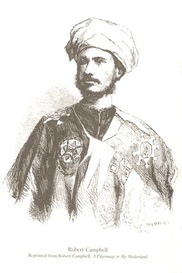the Jamaican background
Robert Campbell was born in Kingston, Jamaica, on May 7, 1829. His mother was the child of Stephen Wood, an Englishman holding the position of deputy marshall in the city, and a woman of pure African ancestry, whose parents were both born in Africa. This certainly suggests that his maternal grandmother was probably a slave. His father was a Scotsman, presumably bearing the very common Jamaican name of Campbell. Young Robert would certainly have received some elementary schooling before he was apprenticed to a printer around 1840. Five years later he was working as a printer, but in 1847 enrolled at the newly established Normal School, or Government Teacher Training College in Spanish Town. There English, Latin, Greek, mathematics and geography were well taught, but science and agricultural instruction were not on the syllabus. After graduating in 1849 he took a schoolmaster's job in Kingston, and also got married. He found it difficult to make ends meet, and could not find other work to supplement his inadequate teacher's salary. In 1850 Jamaica was hit by a devastating epidemic of cholera, in which some 32,000 people died. Problems of life in Jamaica at that period led many to contemplate migration, especially to Central America and Australia; in 1852 Campbell took his family first to Nicaragua, and then to Panama, but failed to find any opportunities for making a good living. In 1853 he moved with his family to New York.
Kingston as Robert Campbell knew it:
'He neither rejected Western culture as alien, nor considered assimilation into indigenous cultures practical. Aspects of Western culture that were useful, for example, commerce, education, scientific investigation and Christianity, had to be harnessed for the benefit of Africa. From the moment in 1858 when he accepted Delany's invitation to join the Exploring Party until his death in 1884, Campbell displayed an unfailing commitment to the "advancement" of Africa.' R J M Blackett, Beating Against the Barriers.

